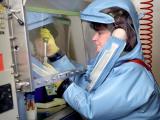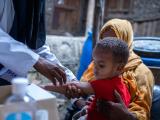Jun 7, 2004 (CIDRAP News) – The Department of Health and Human Services (HHS) has proposed shifting about $55 million in biodefense funds from ongoing state preparedness programs to several new programs, focusing largely on efforts in 21 major cities.
HHS Secretary Tommy Thompson recently proposed reducing the fiscal year 2004 grant for each state by about $1.1 million and using $39 million of the resulting money for the "Cities Readiness Initiative." The initiative consists mainly of planning for the rapid distribution of medicine and supplies in the event of bioterrorist attacks in the 21 cities.
Another $11.9 million in diverted funds would be used to develop an automated system, called BioSense, for detecting signs of bioterrorist attacks and disease outbreaks by monitoring health data. The remaining $4 million would be used to increase the number of federal quarantine stations at ports of entry from the current eight to 25.
The HHS proposal has drawn criticism from several public health groups, including the Association of State and Territorial Health Officials, the American Public Health Association, and the Trust for America's Health. The groups say the new programs, worthy as they may be, should not be developed at the expense of ongoing state preparedness programs.
However, with the approval of Sen. Arlen Specter, R-Pa., chair of the Senate Appropriations Subcommittee on Labor, Health and Human Services, it seems likely that the HHS proposal will be adopted, according to HHS officials. Thompson had explained the proposal in a May 19 letter to Specter and other congressional leaders, and last week Specter said he would not object to it.
"[Given] the fact that Senator Specter has given his OK, I think things are clear to go ahead," a spokesman in the HHS Office of Public Health Preparedness in Washington, DC, told CIDRAP News. He said HHS may need to hear from House leaders too, "but all indications are that we're going to go ahead with the program, as was outlined in the letter to Specter."
Thompson had to explain the funding shift to Congress because the money was already allocated in an appropriations bill, according to a report last week by Govexec.com. The state preparedness funds are administered by the Centers for Disease Control and Prevention (CDC).
In his letter to Specter, Thompson said "specific and rapid improvements in readiness" are necessary because of increased concern about possible attacks on the nation in the next few months. He also said that as of May 7, states still had not spent 18% of the CDC preparedness funds they received in fiscal year 2002 and 70% of the money they received in 2003.
Last year each state (and four major cities) received a base grant of $5 million, plus additional funds in proportion to population. Thompson proposed to reduce the 2004 base grant by $1,085,000. US territories will also have a reduction in their base grant, from $500,000 to $391,500.
Under the Cities Readiness Initiative, 21 cities would receive a total of $27 million to increase their ability to deliver medicine and medical supplies in a public health emergency, according to Thompson's letter. The amounts range from $5.1 million for New York City to $690,000 for Pittsburgh and St. Louis.
In addition, the US Postal Service would receive $12 million to help the cities distribute the drugs and supplies. The money would be used to find and train volunteers and security escorts and to provide protective respiratory equipment for USPS personnel to use when delivering materials after the release of an airborne pathogen.
Thompson's letter says that the planned increase in CDC quarantine stations is needed because of the threats posed by diseases like SARS (severe acute respiratory syndrome) and H5N1 avian influenza. "CDC plans to accelerate its quarantine expansion plan by reallocating $4 million from state and local capacity to initiate this important work" in fiscal year 2004, the letter states. Plans include expansion of existing stations as well as establishment of new ones. The existing stations are at airports in Atlanta, New York, Miami, Chicago, Los Angeles, San Francisco, Seattle, and Honolulu.
Thompson wrote that the CDC began work on the BioSense surveillance program in 2003 and plans to spend $17.9 million of fiscal year 2004 funds on it, including $11.9 million to be shifted from the state preparedness program. BioSense will analyze "diagnostic and pre-diagnostic health data" from the general population to look for signs of bioterrorist attacks or other disease outbreaks, according to the letter.
Leaders of the three public health groups criticized the HHS plan in statements issued recently.
"While we agree that rapid improvement in areas of vulnerability is needed and the cities program represents an important new approach, new funds should be invested to meet these needs," Georges C. Benajmin, MD, executive director of the American Public Health Association (APHA), said in a news release.
"This proposal amounts to about a million dollar cut to each state, which comes on top of the administration's fiscal year 2005 budget request that already cuts public health preparedness for state and local governments by more than $105 million," Benjamin added.
Mary C. Selecky, president of the Association of State and Territorial Health Officials (ASTHO), complained that federal officials "have changed priorities several times" since public health preparedness funds for states were dramatically increased in 2002. "First we were asked to shift gears and focus on a massive smallpox immunization initiative," she said. "Then we were asked to expand our role in disease surveillance, food security, and mental health issues related to terrorist events. Now it is proposed that funds be redirected for another federal initiative."
Selecky said state health departments "have obligated over 90 percent of the funds allocated for FY 2002 and are carefully deploying FY 2003 funds.
The Trust for America's Health (TFAH) said the funding shift could hurt state preparedness efforts such as the hiring of trained epidemiologists and public health nurses, the purchase of laboratory equipment and hiring of scientists needed to identify biological or chemical agents, and the monitoring of food and water safety.
See also:
TFAH news release
http://healthyamericans.org/newsroom/releases/release052404.pdf



















